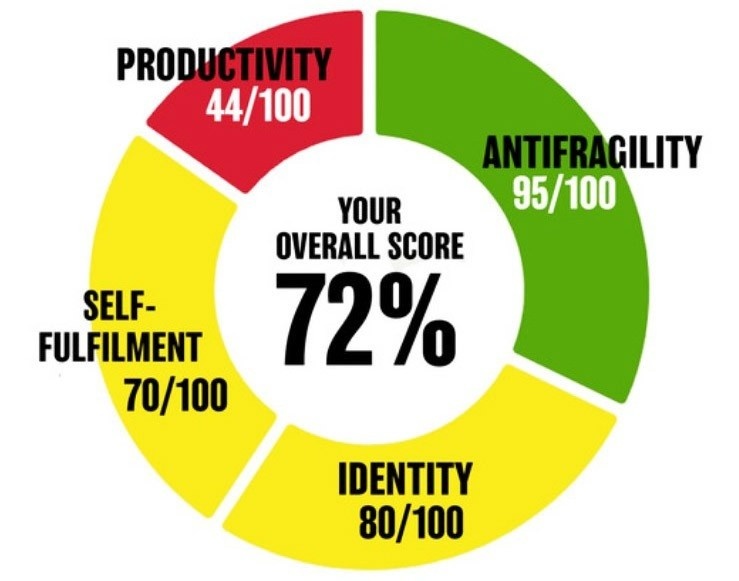SUMMARY
- Today we’re going to be talking about what makes a great leader, and all of these things are things that you can learn.
- Number one, the key thing to becoming a great leader is to build what’s called vulnerability based trust. People don’t like working with someone who never makes a mistake, right?
- The number two area that great leaders excel in is around decisiveness, so the ability to prioritize speed over precision and decision-making. It’s much better to make a decision quickly, even if it’s the wrong decision, than to sit there and deliberate in analysis paralysis and never move forward.
- Number three area that is a hallmark for great leadership is around reliability. Great leaders do what they say they’re going to do. If you’re not building your personal integrity bank account by doing the things that you say you’re going to do, you will not separate yourself from all the want to be great leaders.
- Number four thing that great leaders do is that they are productive. They take the time to figure out what are the right things that they should be working on.
- Number five, great leaders rally everyone behind a great vision. What is the vision that you could be using to inspire yourself and others?
- Number six, great leaders then think about the strategy that’s necessary to achieve that vision. How are you going to go about using what’s unique about you or your group or whatever to achieve that vision?
- Number seven is all about execution. We’ve got a great strategy. We need to execute. We actually need to get this stuff done.
- Number eight, great leaders remember that they’re managing or they’re leading a team, not a family. There’s a big difference between the two because families strive to stick together no matter what, whereas teams are optimized to win at all times.
- Number nine: Great leaders have difficult, tough conversations. They don’t shy away from them. They step into them.
- Number 10, great leaders mind the metrics. They make sure that everyone knows the metrics, the points, the things that are needed to win the game.
- Number 11, great leaders practice anti-fragility. They recognize that stress actually builds strength. They step into discomfort.
- Number 12, great leaders make bold moves. When things change, great leaders step into that change. Great leaders don’t shy away.
- Great leadership is not something that can’t be learned. It is learnable. It’s something I learned.
TRANSCRIPT
How can I become a great leader? This is one of the most common questions I get working with the entrepreneurs that I coach as they’re developing themselves and their businesses, and despite what other people would have you believe, leadership and the act of becoming a great leader is not something that can’t be learned. I should know, because I didn’t start off in my journey as a great leader, but it was something that I learned how to do and it culminated with being recognized as the CEO of the Year in the UK in 2019.
Hi, my name is Eric Partaker and I’m on a mission to help entrepreneurs reach their full potential in business and life. Today we’re going to be talking about what makes a great leader, and all of these things are things that you can learn. They are all things that I learned myself, so really excited today to take you through my 12 disciples of great leadership, and make sure you stick around for all of these because if you take notes, you can seriously up your leadership game and become the great leader that you deserve to be.
Number one, the key thing to becoming a great leader is to build what’s called vulnerability based trust. People don’t like working with someone who never makes a mistake, right? Nobody wants to work with a leader who seems infallible, who doesn’t seem human. One of the strongest things that you can do to build your leadership ability is to simply admit when you make a mistake, to say you’re sorry, to say, I screwed something up, to say I got that wrong. It’s one of the most powerful things you can do, because once you do that, then the rest of the people that you’re seeking to lead, they realize that, okay, this person’s human. They make mistakes too, and then it frees them up to be able to make mistakes as well.
If they have the ability to make mistakes, what does that mean? It means that they have the ability to step outside of their comfort zone, to develop themselves, to give it their all, perhaps, in an area that they don’t feel 100% comfortable in, and if they’re able to make more mistakes, they can learn from that, and if they can learn from that, they can develop and they’ll achieve better results over time.
The number two area that great leaders excel in is around decisiveness, so the ability to prioritize speed over precision and decision-making. Great leaders need to make lots of decisions day in and day out. Some decisions relate to the work that they’re doing. Sometimes it’s just to nudge and help others. It’s important, once again, to prioritize speed over precision in that decision making. It’s much better to make a decision quickly, even if it’s the wrong decision, and be able to kind of move on and keep the tempo going than to sit there and deliberate in analysis paralysis and never move forward.
Decisiveness is, again, a critical area for great leadership. There’s tons of books that you can find on improving your decision-making ability and decisiveness. If that’s an area that you want to improve, there’s plenty of resources out there to help you up your decisiveness game.
Number three area that is a hallmark for great leadership is around reliability. Great leaders do what they say they’re going to do. If you want to up your leadership game, then take note of all those times when you say, yeah, I’ll get back to you. Yes, you’ll have this by such and such a date. Yeah, I promise I’ll have that delivered by that time, because you can not become a great leader if you are not demonstrating your reliability to others. If you’re not building your personal integrity bank account by doing the things that you say you’re going to do, you will not separate yourself from all the want to be great leaders out there and those who truly lead in a powerful, great way.
Number four thing that great leaders do is that they are productive. What do I mean by productive? They take the time to figure out what are the right things that they should be working on. You can’t be doing absolutely everything. What are the things that matter most? A useful tool for that is the 80/20 rule. Out of all the things that you could be focusing your energy on, what are the 20% of things that will drive 80% of the results, and focus your efforts there. You can’t do everything.
Another great thing to improve productivity is to combine that with something called Parkinson’s Law. You may or may not have heard of Parkinson’s Law, but it basically states that work will expand to fill the time given for its completion. We’ve all experienced this before, right? You’re an hour before a deadline and you feel like, oh my gosh, I don’t know how I’m going to get this done and somehow you get it done. If you had been given four more hours, you would have easily filled those four hours as well. The thing that Parkinson’s Law teaches us from a leadership or a productivity point of view is that we should try to constrict the time that we give ourselves to complete tasks. You’ll surprise yourself productivity wise if you actively restrict your time. You will produce things at a faster and faster rate.
Number five, great leaders rally everyone behind a great vision. When I was helping build Skype, our vision was that the whole world could talk for free. Imagine the spirit that was created inside the company. When I built Chillango, the chain of restaurants that I founded, our vision was to make the world a more vibrant place. What is the vision that you could be using to inspire yourself and others, because great leaders think of a vision that goes beyond them, and that makes the world a better place.
Number six, great leaders then think about the strategy that’s necessary to achieve that vision. What do I mean by strategy? Simply, how are you going to go about using what’s unique about you or your group or whatever to achieve that vision? How are you going to use your unique strengths? How are you going to minimize your weaknesses? How are you going to achieve that glorious vision that you’ve painted for everyone to rally behind? A hallmark of a great leader is coming up with and being a serious or key kind of player in formulating and developing that strategy.
Number seven is all about execution. We’ve got a great strategy. We need to execute. We actually need to get this stuff done. A great leader will make sure that they’re not just focused on their own personal productivity, but that they’re creating and installing practices or mechanisms that will create strong execution, a strong rhythm of getting things done within the company. This is basic stuff like making sure you’re having a weekly one-to-one meeting with a member of your team, that you’re assembling the people on your leadership team in a weekly meeting to measure progress and make sure that everyone’s on track. That on a quarterly basis you’re making sure everyone comes together to establish what are the goals.
What are the things that we’re going to be working on for the next 90 days? By the way, how did the last 90 days look? Did we achieve what we said we were going to achieve? Yes? No? Why not? How does that inform the next 90 day plan? All of these are elements of great execution so that you can get the things done that are needed in the company to make the strategy come to life to hit that vision without there being a lot of drama and without there being that we didn’t get everything done this week. We’re behind again. You want to be on the front foot, and great execution makes sure that that happens.
Number eight, great leaders remember that they’re managing or they’re leading a team, not a family. There’s a big difference between the two because families strive to stick together no matter what, whereas teams are optimized to win at all times, and great leaders respect that day in and day out. That means making some tough decisions sometimes and having some difficult conversations, which in fact is a segue to number nine.
Great leaders have difficult, tough conversations. They don’t shy away from them. They step into them. What do I mean by difficult conversations? I mean like telling somebody that their performance was good, but not great, or telling somebody that their performance isn’t going to cut it and that their job’s on the line or telling someone that unfortunately there is no longer a place for them on the team. These are conversations that we don’t like to have. We shy away from them. They create discomfort for ourselves, for the other person that we’re talking to, but great leaders respect that they’re going to do themselves, the company, the team, and that other person a disservice by not being frank with them and telling them the truth on where things stand. If you want to up your leadership game, step into those difficult conversations.
Number 10, great leaders mind the metrics. What are the numbers? What are the metrics which are most important for the team’s success? How are we measuring the team’s results? What’s the scoreboard? How do we know if we’re winning or losing, and is that scoreboard visible? Great leaders make sure that everyone knows the metrics, the points, the things that are needed to win the game and that everyone can clearly see how they are doing. Are we winning or losing and how much time is left on the clock?
Number 11, great leaders practice anti-fragility. What do I mean by anti-fragility? The whole concept that stress actually builds strength. Our bodies know this without even having to tell the body what to do. We stress a muscle, it causes it to grow. You expose the body to germs and bacteria, it builds the immune system. Great leaders keep up here in their head what’s naturally occurring in their body. They don’t shy away from stress. They don’t try to stress themselves out by having a stress-free existence. They recognize that stress actually builds strength. They step into discomfort. They turn life into one big mental gym, such that every adversity challenge or thing that doesn’t go their way is nothing more than a personal trainer, if you will, handing them a dumbbell and asking they to complete the repetition. They can either step away from the dumbbell, not complete the rep, not strengthen themselves, or they can step into it, complete the repetition, done, next, move on. Great leaders practice anti-fragility. They become stronger as a result of their stress because of the way they reframe it in their minds and they step into it.
Number 12, great leaders make bold moves. This is especially important when the environment is constantly rapidly changing. When things change, great leaders step into that change. Great leaders don’t shy away. When things change, when the environment becomes disrupted, when the whole business gets disrupted, when a team gets disrupted, great leaders look for the opportunity to make a bold move. How can they find a gap in the defense? How can they find an offensive opportunity that perhaps others aren’t willing to take, and great leaders step into that gap. They step into that opportunity and they make a bold move, whereas others perhaps are waiting on the sideline to see what’s going to happen.
I hope you found that useful. Great leadership is not something that can’t be learned. It is learnable. It’s something I learned. Those are the 12 disciples or principles that I’ve found in my life and in my business career that have led to great leadership for me. They certainly are a collection of things that I worked on, developed and practiced that led to that CEO of the Year recognition for me. I hope you’ve enjoyed that, and if you head over to my website at ericpartaker.com, you’ll also be able to subscribe to my weekly insights newsletter.




